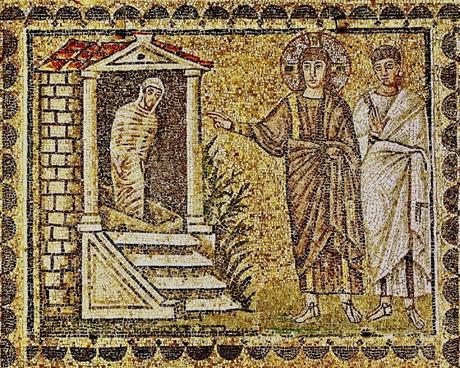John 11.1-45
Jesus could have saved Lazarus
Jesus could have traveled to Bethany, when he heard that Lazarus was ill – and he could have healed him.
But he does not: “though Jesus loved Martha and her sister and Lazarus, after having heard that Lazarus was ill, he stayed two days longer in the place where he was.” John 11:5-6
The thing was that there was something more important that Jesus wanted to do
– more important than saving Lazarus, his friend, from death.
– more important than allowing Martha and Mary drop into the pit of the abandonment and desertion of death.
Jesus wanted to show them, and he wanted to show us through them, the glory of God.

Sometimes he answers immediately and wonderfully
But many times there is no immediate answer
And for us:
We’re praying for peace – and there is no peace. In fact the situation just gets worse.
Maybe we are looking for work – we’re trying to be faithful to Him, and nothing seems to come.
Maybe we are watching the life of someone we love unravel – we pray and God does nothing.
Maybe we are facing sickness – we seek God and there is no relief.
And Jesus seems to stay away.
But there is hope in this story, because it suggests that there is a reason why he stays away – even if we do not at first understand.
And the reason is that he wants us to glimpse the Glory of God.
Twice in this passage Jesus says that:
V4, “This illness does not lead to death; rather it is for God’s glory, so that the Son of God may be glorified through it.”
V40, “Did I not tell you that if you believed, you would see the glory of God?”
So what is this glory that he would us to see?
1. He wants them to see a glimpse of the heart of God
God’s glory is when his Son is glorified.
‘Rather it is for God’s glory, so that the Son of Godmay be glorified through it’.
It is all about revealing the relationship between the Father and the Son
They are so close, so intimate, so ‘on the same page’, so intertwined that when one is glorified, the other is glorified.
When Jesus stands outside the tomb of Lazarus, he prays out loud so that everyone can hear: “Father, I thank you for having heard me.I knew that you always hear me, but I have said this for the sake of the crowd standing here, so that they may believe that you sent me.” John 11:41-42
He wants people to know – through his raising Lazarus from the dead – that God is his Father: He cries out, ‘Father’. He wants them to know that God listens to Him. And he wants them to know that his Father has sent him.
Jesus came from the heart of God, and is the heart of God
In Gogol’s wildly surreal novel, ‘Нос’ (the nose), Kovalev’s Nose declares independence, dresses as a senior civil servant and goes walkabout in St Petersburg.
Well, in Jesus, God’s heart goes walkabout.
There is a difference. Whereas Kovalev had no say in his nose’s antics, the Father sends his heart into the world.
And Jesus, as God’s heart is both with us, and remains with his Father
(by the way, this is not dogmatic theology – this is me using poetic license!)
This is the heart that holds Father and Son together
This is the heart that reaches out to us
This is the heart which saw the devastation that death brings, which felt the controlled inner grief of Martha, and saw the open emotive grief of Mary, and those with her, and which wept.
This is the heart which would reach out and embrace us
And this is the heart which would come and live in us, and shape us and draw us into the life of the Father and the Son.
When we walk through times of darkness
When we walk through the valley of the shadow of death
If we turn to Jesus we may not see an instant answer
It may appear that he stays where he is for two more days
But if we are faithful, and hold on – oh and by the way it is OK to be honest with him: notice how both Martha and Mary say exactly the same thing to Jesus, “Lord, if you had been here, my brother would not have died”. John 11:21. There is a cry of anger and frustration and despair there. ‘You let us down’.
But if, despite our confusion, we hold on, then we will see his love.
Indeed more than that, we will come to share his love.
Paul writes, “we … boast in our sufferings, knowing that suffering produces endurance, and endurance produces character, and character produces hope, and hope does not disappoint us, because God’s love has been poured into our hearts through the Holy Spirit that has been given to us”. Romans 5:3-5
2. Jesus wants them to see that he is the One who not only gives life, but who is life.
Mary believes in the resurrection on the last day.
That is what many ordinary orthodox (with a small ‘o’) Christian believers also believe today
We believe that after we die, we will be raised to life.
But Jesus offers so much more.
Yes, Jesus has authority over death.
We have been reading in John’s gospel how Jesus tells us that he has been given the authority to speak to the dead and that the dead will hear him, and that those who trust his word will rise to life, and those who reject him will be condemned.
Jesus here speaks to a dead man, and the dead man hears. That is incredible.
He calls Lazarus – Lazarus is dead. He has no ability to hear, no ability to respond.
Jesus speaks to him, and his word penetrates deep – deep into the lifeless Lazarus. And Lazarus hears and obeys.
It is like those dead bones in Ezekiel 37. The Spirit of God comes into them and brings life.
But Jesus offers more.
Jesus does not just have authority to give life to the dead.
He is life itself. He is the source of life.
And he offers Lazarus, and he offers Martha and Mary, and he offers us, a relationship with Him who is life
He says here: Not, ‘I give the resurrection and the life’, but ‘I am the resurrection and the life’.
And if we hear him, if we come to him, if we receive him, then we will not only be given life – real life, true life, spiritual life which starts to shape and transform our physical life – but we will come into communion with life itself.
Up to now we have been zombies, flesh walking about doing flesh stuff. Eating, drinking, having sex, not having sex, partying, not partying, growing old, dying.
But Jesus says that if we come to him, we will come alive – truly alive, spiritually alive.
Jesus says to Martha, “I am the resurrection and the life. Those who believe in me, even though they die, will live, and everyone who lives and believes in me will never die. Do you believe this?” John 11:25-26
Our world does not offer us life in the land of the living.It offers us 70 – 80 or so years in the land of the dying.Jesus is saying to Martha, not ‘I’m going to offer Lazarus a few add on, bonus years in the land of the dying’. He says to her, and he says to each one of us: I offer Lazarus, and I offer you, life in the land of the living. Come out of the land of the dying and into the land of the living (V25)
I was struck by a prayer that we prayed in morning prayer on Saturday when we celebrated the Annunciation. I put it on our social media channels. In it, we pray that 'As your living Word, eternal in heaven, assumed the frailty of our mortal flesh, may the light of your love be born in us to fill our hearts with joy ..’
‘The light of your love be born in us’:
When we receive Jesus, his Holy Spirit, his love comes into us. We begin to know ourselves beloved by God, forgiven by God; we are able to call out in love to God and for God. And as we begin to become aware of God’s love alive in us, so that love becomes our light – it shapes our thinking and feeling, it starts to guide us, to lead us. That is the LIFE that Jesus is talking about here.
And Jesus shows his glory, he shows that he is ‘the resurrection’ by raising Lazarus from the dead.
3. Jesus wants them to see that he is the one who sets people free.
His last words are important: ‘Take away the stone’; ‘Unbind him and let him go’.
Elsewhere he says that ‘the truth will set us free’ and ‘if the Son makes you free, you will be free indeed.’ (John 8.32-36)
Jesus is the one who can set us free from everything that prevents us from living as sons and daughters of God: the sin which destroys us and others; the fear of death – and the fear of mini-deaths which paralyze us from doing what is good and right and true because we are afraid of failure, or knock back, of being shamed, or of missing out on something better. And Jesus sets us free from the power of death.
Maybe we wonder why Jesus does not come when we call on him. Maybe we wonder why he stays away, and as a result the situation has become worse. And God seems absent. We wonder why God seems absent.
Remember this story: when Jesus hears that Lazarus was sick and waited for 2 days, and as a result Lazarus dies.
It was not because he did not love Martha and Mary and Lazarus, but because he did. He wanted them to see that he was more than a remarkable physician who could heal very sick people. He wanted them to see a glimpse of his love; he wanted them to see that that he is the one who is life; he wanted them to see that he has come to roll away tomb stones and set people free. He wanted them to see his glory.
And so, when the tragedies hit us, when the prayers are not answered, when it seems that God has gone absent – if we turn to Jesus, if we are honest with him and open to him, in His time, we will see his glory.
John writes (1.14), ‘We have seen his glory, the glory as of a father’s only son, full of grace and truth.”

